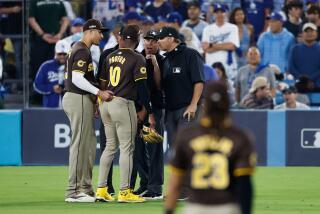Browns Go to Dawgs After Emotional Day : Pro football: Loyal Cleveland fans get some solace from players following victory over Bengals, but now it’s time to leave.
- Share via
CLEVELAND — The sun rose on the quiet anger of a steelworker, setting fire to a lighter fluid-drenched dummy of Art Modell, stringing it on a sign across a nearby interstate.
By mid-afternoon, truck drivers and teachers were tearing out the wooden bleachers where they have sat for decades, tossing them onto the field like giant toothpicks.
But the 50-year relationship between the Cleveland Browns and their fans was never about hatred or destruction. And so the most emotionally turbulent day in many NFL seasons Sunday ended with the gentleness of a hug.
The Browns’ probable final moments at Cleveland Stadium were spent at the base of the famed Dawg Pound cheering section, padded arms wrapped in fans, helmets smothered in gloves and kisses, ears filled with painful whispers.
“They were telling me, ‘Please don’t leave, please don’t leave,’ ” tackle Tony Jones said.
But leave they will, for Baltimore next season, unless the NFL or a judge can devise a precedent-setting way to make owner Modell stay.
The Browns’ 26-10 victory over the Cincinnati Bengals marked their final home game after 50 years in the worn stadium.
A postgame rush by about two dozen veteran players to the east end zone bleachers, where fans became famous for their dog masks and passion, marked their final home gesture.
Rob Burnett, a defensive end, was one of the first to get there. As Burnett stood against a rickety fence with his arms raised, a mustachioed, red-faced construction worker named Greg Topovski grabbed him around his waist.
Moments later, Topovski was crying into Burnett’s brown number 90.
Said Topovski: “It is like losing your best friend.”
Said Burnett: “A piece of me is going to be on this field forever.”
How close were the players and fans here? In 351 games dating back to the Browns’ debut in the All-America Football Conference in 1946, about 22.5 million fans have purchased tickets to the 78,512-seat stadium.
That is an average of about 64,000 per game.
All 351 games.
For half a century.
“These are the best fans, of any sport, anywhere, in the United States,” defensive back Eric Turner said. “There is a oneness here between the team and town that you don’t find anywhere else.
“When we won, it was like everybody in town had a good week. When we lost, it was like everybody felt terrible.”
Turner is suffering from two broken bones in his back, he watched the game in street clothes, yet even he ran to the Dawg Pound afterward.
While stadium and game officials worried about postgame violence--the teams were turned around twice in the fourth quarter so players would not venture into the end zone in front of the Dawg Pound--there was nothing more dangerous than a cherry bomb and a few benches that emerged.
Nobody charged the field. Nobody grabbed for the goal posts. Nobody did anything worse than chant an obscenity about Modell, although that particular chant has been as common around this town for the last two months as “How do you do?”
“I have enough stuff,” said Vince Erwin, a dog-masked factory worker better known as “D-Dog.” He pointed to his mask, his large orange bone, the dozens of Brown trinkets and memorabilia that were pinned to his many friends.
“We all have our memories,” Erwin said. “We don’t need anything else.”
Just the same, one fan leaned out of the stands after the game with a tiny hand rake. He furiously scraped up some end zone sod and placed it in his pocket.
Next to him, sales representative Deborah Bruch could not stop sobbing.
“We’re like the children of a divorce,” she said. “We’re losing somebody we love, and there’s nothing we can do about it.”
When Jones absolutely could not hug one more person without crying himself, he jogged back to midfield, where he knelt, alone.
“I wanted to thank God for giving me an opportunity to play in this place,” he said.
Perhaps even more surprising than the Browns’ postgame display was their performance during the previous three hours.
This was the first game they won since the news of their move became public on Nov. 5. During their seven losses since then--a stretch that turned a championship contender into putty--they were outscored, 166-74.
The Bengals, meanwhile, had won three of five games and were in contention for a playoff spot for the first time since 1990.
But the Browns scored on three of their first five possessions, had nearly doubled the Bengals in total yardage at halftime, and were never threatened.
Not that the game had anything to do with anything.
“The fans were tearing up the stands for us, the least we could do was tear up the field for them,” said receiver Michael Jackson, who threw a ball into the Dawg Pound. “They were definitely our inspiration.”
The most avid of those fans began the game, as they have every game for years, at a municipal parking lot several blocks from the stadium. This is where residents of the Dawg Pound began their final day of mourning.
The lot is wedged between a railroad track and the I-90 freeway. There are only two portable toilets, the car and train noise can be deafening, and the walk to the stadium on a sub-zero day can nearly kill you.
Yet fans have grown up in this lot, which often begins filling the night before a Sunday home game. People have been married here, spent their honeymoons in vans here, and returned here 10 years later in separate cars.
“It’s so weird, and so sad,” said Jim Dombrowski, a schoolteacher and Muni Lot regular. “I’ve drank with guys here who just got married, smoked their cigars after they had babies, then drank with them after their divorce . . . and never once knew their last names.”
Who needs a last name when you can hang with Cincinnati Bob, Crazy Rob, and the Alpo Man?
They all showed up again for the last time Sunday, all gathering solemnly around Roy Maxwell, a steelworker who had been attending Brown games for 38 years.
On Saturday night he spent four hours in his basement, building a replica of Modell, all for the opportunity to string him up on the edge of the Muni Lot at 10:45 Sunday and watch him burn.
A crowd of 50 cheered as the dummy slowly went up in flames. But as its ashes began floating through the cold air and on to their coats and hats, they became silent. Like people do when a bad dream becomes real.
Maxwell looked down and said, “I was at a party Saturday, and a guy says to me, ‘Gee, Roy what are you going to do? Without the Browns, you’re nothing.’ What was I going to tell him? I didn’t know what to tell him.”
More to Read
Go beyond the scoreboard
Get the latest on L.A.'s teams in the daily Sports Report newsletter.
You may occasionally receive promotional content from the Los Angeles Times.











